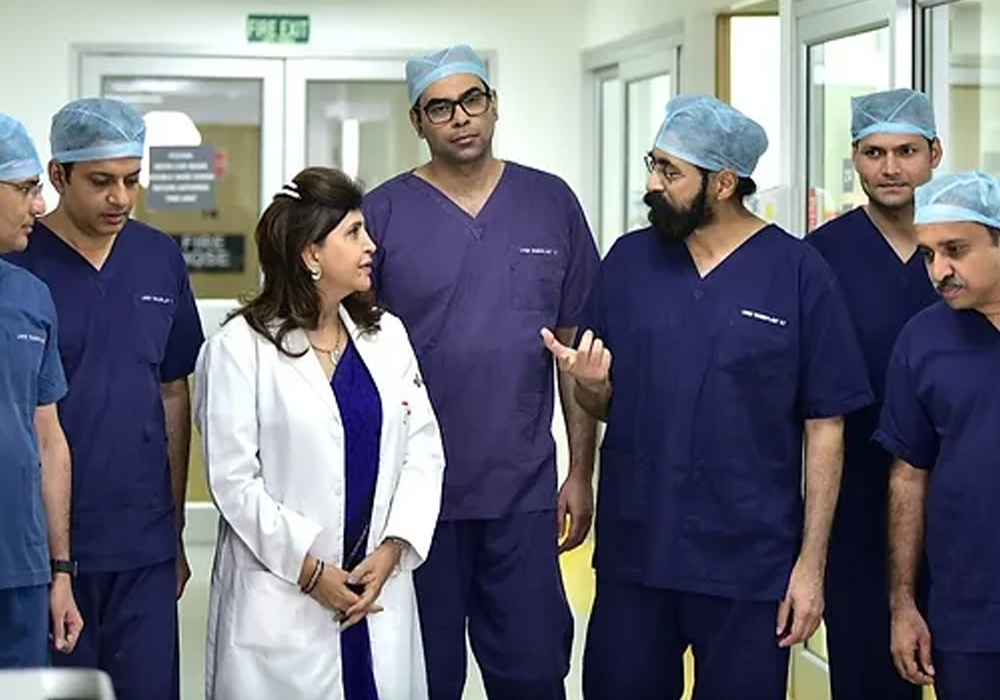- 0120-4438-111
- info@searchmymedical.com
- Office No 519, B Tower, Ithum Tower, Noida Sec 62.
Liver Transplant
Home > Liver Transplant

What is a Liver Transplant?
Liver Transplant is a surgical procedure in which a diseased or damaged liver is replaced with a healthy one from a donor. This life-saving operation is often the last option for patients with end-stage liver disease or severe liver failure. The liver is a vital organ, and when it fails, it can affect many other systems in the body. A liver transplant offers patients a chance to live a longer, healthier life.
When is a Liver Transplant Needed?
A Liver Transplant may be necessary for patients with the following conditions:
Cirrhosis:
Chronic Liver damage leading to scarring of the liver tissue, often caused by alcohol abuse, hepatitis, or fatty liver disease.Liver Cancer:
In some cases of Liver Cancer, if the tumor is confined to the liver and surgery is not an option, a transplant may be considered.Acute Liver Failure:
Sudden and severe Liver Damage, often due to viral infections, medication overdose, or toxins, can lead to the need for a transplant.Genetic Liver Diseases:
Conditions such as Wilson’s Disease or Hemochromatosis, where the liver’s ability to function is impaired due to inherited disorders, may require a liver transplant.Non-Alcoholic Fatty Liver Disease (NAFLD):
This condition can progress to cirrhosis and liver failure in people with obesity, diabetes, and metabolic syndrome.
The Liver Transplant Procedure
The Liver Transplant procedure involves several key steps:
Pre-Transplant Evaluation:
Before the transplant, patients undergo a series of tests to assess their overall health, including blood tests, imaging scans, and liver function tests. These evaluations help determine whether the patient is a good candidate for the procedure.Finding a Donor Liver:
A suitable Liver Donor is found through organ donation networks, with priority given to patients based on medical urgency, compatibility, and availability. The donor can be living or deceased. In the case of a living donor, a portion of the donor’s liver is removed and transplanted into the recipient, with both livers regenerating afterward.The Surgery:
The Transplant Surgery typically takes between 6-12 hours. During the procedure, the diseased liver is removed and replaced with the donor liver. Surgeons reconnect the liver to the patient’s blood vessels and bile ducts, ensuring proper blood flow and bile drainage.Post-Surgery Care:
After surgery, the patient is closely monitored in the hospital for complications like infection, bleeding, or organ rejection. Immunosuppressive medications are prescribed to prevent the body from rejecting the new liver.
Risks and Complications of Liver Transplant
While Liver Transplants are generally safe, like any major surgery, they come with risks:
Rejection:
The immune system may recognize the new liver as foreign and attempt to reject it. Immunosuppressant medications are necessary to prevent this, but they come with their own risks, such as increased susceptibility to infections.Infection:
The immunosuppressive medications that prevent rejection also weaken the immune system, leaving the patient more susceptible to infections.Bleeding:
There is a risk of bleeding during the surgery due to the complexity of the procedure and the liver’s involvement in blood clotting.Bile Duct Complications:
The bile ducts can become blocked or leak after transplant surgery, which may require additional treatment.Chronic Rejection or Liver Dysfunction:
In some cases, the transplanted liver may not function properly over time, leading to the need for further medical interventions.
Liver Transplant Recovery and Aftercare
The recovery period after a liver transplant can vary depending on the individual, but generally includes the following steps:
-
Hospital Stay:
After the surgery, the patient typically stays in the hospital for 1-2 weeks to recover, depending on their overall health and progress. -
Immunosuppressive Therapy:
Patients must take immunosuppressive drugs for the rest of their lives to prevent organ rejection. These medications suppress the immune system, but they need to be closely monitored for potential side effects. -
Regular Follow-Ups:
Frequent follow-up visits are necessary to monitor liver function, check for signs of rejection, and manage medications. Blood tests and imaging may be used to ensure the new liver is functioning properly. -
Diet and Lifestyle Changes:
After a liver transplant, maintaining a healthy diet and lifestyle is essential for optimal recovery. Patients are encouraged to avoid alcohol and eat a balanced diet rich in nutrients. -
Physical Activity:
Most patients can return to normal physical activities within a few months, but they should follow the advice of their healthcare team to avoid overexertion in the early stages of recovery.
Living Donor vs. Deceased Donor Liver Transplant
Living Donor Liver Transplant involves a healthy person donating a portion of their liver to the recipient. The liver has the remarkable ability to regenerate, so both the donor and the recipient can expect their livers to grow back to normal size over time. This type of transplant is typically reserved for patients with certain liver conditions and can reduce waiting time for a transplant.
A Deceased Donor Liver Transplant involves receiving a liver from someone who has passed away. This is the most common type of transplant, and patients are placed on a waiting list until a suitable donor is found.
Advances in Liver Transplantation
- Expanded Criteria: More flexible criteria for donor selection and recipient eligibility, allowing for transplants in patients previously considered too high risk.
- Living Donor Programs: Increased focus on living donor liver transplants, which can help alleviate the shortage of available organs.
- Regenerative Medicine: Research into techniques such as bioengineering and stem cell therapy holds promise for future treatment options.
Ethical Considerations
- Organ Allocation: The fair distribution of donor organs remains a crucial ethical issue, governed by specific protocols and criteria.
- Living Donation Ethics: Addressing the implications and potential pressures associated with living organ donation.
How Search My Medical Will Help You
- Specialized Search: You can search for surgeons who specialize in the specific type of surgery you need, ensuring that you’re in the hands of an expert.
- Patient Reviews and Ratings: Read reviews from other patients to get insights into the surgeon’s experience, bedside manner, and overall patient satisfaction.
- Flexible Options: You can often choose from a variety of appointment times and dates to accommodate your schedule.
- Treatment Options: Learn about different surgical options available for your condition, along with the associated risks, benefits, and recovery times.
- Appointment Coordination: We manage all aspects of scheduling your surgery, including initial consultations, pre-operative assessments, and the surgical date.
- 24/7 Assistance: Our team is available around the clock to address any concerns or emergencies that may arise during your journey.
Latest Post
-
Opps, No posts were found.
Want to consult about health? Contact Us
We ensure a seamless experience. Our network also provides detailed post-surgery support.
Get in Touch
Get in touch with us for any questions or inquiries. We’re here to help and provide the information you need. Reach out via phone, email, or through our website contact form.


Emergency Contact
- Free Call 24/7
- +91 0120-4438-111


Hospital Location
- Open In 24 Hours
- SMM, B Tower, Ithum Tower, Noida Sector 62.


Phone Contact
- Within Working Hours
- +91 8810549762
